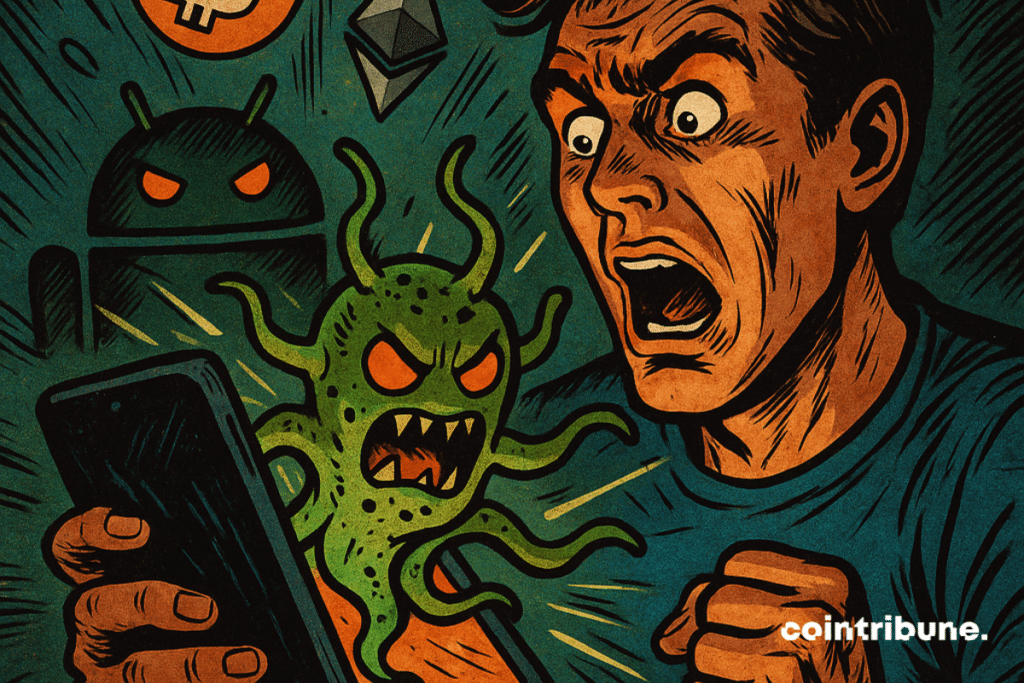Crocodilus: The New Android Malware Targeting Your Crypto And Bank Accounts
The global digital scene is witnessing the emergence of an invisible yet formidable predator: Crocodilus, an Android malware with voracious ambitions. First detected in March 2025, it quickly mutated, going from a simple regional test to a planetary offensive. And it’s not your holiday photos it’s interested in, but your money — especially the money you thought was safe in your crypto wallets.

In Brief
- Crocodilus takes full control of Android devices.
- It spreads via fake Facebook ads related to banking and crypto.
- It steals seed phrases and private keys from crypto wallets.
A Malware That No Longer Plays Hide and Seek
After Microsoft’s alert, Crocodilus is not just another malware to add to the already long list of Android threats. It is an ultra-sophisticated banking trojan capable of taking full control of your device. It doesn’t just collect your credentials; it manipulates your contacts, hijacks your calls, and can even inject false information directly into your address book.
Imagine receiving a call from a supposed customer support of your bank… while it is actually the attacker who remotely created this fake contact.
Its modus operandi? Elegant and insidious. Facebook advertisements disguised as banking or e-commerce apps, promising bonuses, encourage users to download a fake application. Once installed, it opens the door to all compromises: personal data, passwords, and especially, access to your crypto accounts. The Crocodilus malware, recently identified, takes this logic even further by gaining total control of the infected device.
Crypto: The New Eldorado for Cybercriminals
What makes Crocodilus particularly worrisome is its growing specialization in the theft of digital assets. As the crypto world industrializes, attracts traditional investors, and gains legitimacy, it also becomes a prime target for the most methodical cybercriminals. And Crocodilus is built for this hunt.
By exploiting Android’s accessibility features, the malware intercepts recovery phrases (seed phrases), the core of your crypto security. It uses regular expressions designed to automatically identify and extract keywords or private keys. Simply put: it steals access to your digital wallets without you realizing it.
The malware no longer acts silently: it processes the stolen data in real-time, enabling immediate exploitation by cybercriminals. Once your access is compromised, your funds can be moved within minutes… irreversibly.
A Targeted Strategy
Crocodilus does not scatter its seeds randomly. Its campaigns focus on users over 35 years old, a target considered more likely to use digital financial services… and to own valuable assets. Its expansion map is telling: Turkey, Spain, Poland, India, Indonesia, United States, Brazil. No continent is spared.
Even worse, its stealth is its fatal weapon. Malicious ads remain online for barely an hour, accumulating thousands of views before disappearing. A digital ghost, hard to trace, striking where it is least expected.
As Crocodilus sharpens its fangs and expands its digital empire, caution becomes a strategic imperative. Never download banking or crypto-related apps via advertisements, even if they appear legitimate. Always prefer official stores and enable advanced security options on your devices.
Because in this new digital Wild West, crypto assets are no longer just the currency of the future, but also the dreamed loot of tomorrow’s criminals. And Crocodilus is already ready. The arrest in Morocco of the alleged mastermind of crypto-related kidnappings in France illustrates how dangerously the boundary between cybercrime and physical reality is blurring.
Maximize your Cointribune experience with our "Read to Earn" program! For every article you read, earn points and access exclusive rewards. Sign up now and start earning benefits.

Fascinated by Bitcoin since 2017, Evariste has continuously researched the subject. While his initial interest was in trading, he now actively seeks to understand all advances centered on cryptocurrencies. As an editor, he strives to consistently deliver high-quality work that reflects the state of the sector as a whole.
The views, thoughts, and opinions expressed in this article belong solely to the author, and should not be taken as investment advice. Do your own research before taking any investment decisions.